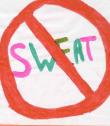Beauty in a Bottle: How do anti-perspirants and deodorants work?
We've moved. Check out the new Beauty Brains website.

Sarah V posts this perspiration puzzle :
Dear Brains: What's the difference between an antiperspirant and a deodorant? What gives?
The Brains respond:
Sara, thanks for probing this pithy perspiration poser! Here’s the real deal - antiperspirants, as the name implies, stop you from perspiring, or sweating. Deodorants simply get rid of odor. Ultimately, both products are trying to do the same thing: stop you from being stinky. But the way they do their deodorizing duty differs.

Before we explain how these products work, let’s talk a little bit about perspiration. It works like this: you sweat and bacteria grow in the moist, warm areas where the sweat collects. When the bacteria grow they “eat” some of the stuff in your sweat (primarily fatty acids) and they “poop” out stuff that smells bad. End result? B.O. (That’s the quick explanation if anyone’s interested in the long version, just let us know and we can dedicate a future post to a more detailed discussion on sweat. Or you can read all about it here. And if you're really interested, read this article about how women crave the smell of men's sweat!)
So, antiperspirants and deodorants offer you two different approaches to fighting smelly bacterial poop. Deodorants contain an active ingredient (Triclosan is most commony used) that prevents the bacteria from growing and devouring your sweat. No bacteria = no body odor. However, you still get Wet Pits (isn’t that Brad Pitt’s brother?)

Antiperspirants, on the other hand, fight the odor problem in a different way. The active ingredients in antiperspirants, typically zinc salts, interact with your sweat glands to stop perspiration. No perspiration = no food for bacteria = no body odor.
Okay, we know what you're thinking, “Isn't it bad for you to plug up your sweat glands like that?” Don’t sweat it. (Ha, that’s a pun – get it?) But seriously, it’s not something you need to worry about. You’re only affecting a small portion of your body’s sweat glands so you’re not interfering with your body’s natural cooling mechanism. But let's save that discussion for another post.
We should also note that antiperspirants do also have some mild anti-bacterial properties, so if you do still sweat little bit not much bacteria will grow.
Oh, and by the way, both antiperspirants and deodorants also contain fragrance to cover up any odor that does sneak through.
So there you have it two different approaches to solving the same problem. Which one should you use? That's really up to you. Are your arm pits sensitive from shaving? You might want to use a deodorant because some antiperspirants can irritate freshly shaven skin. Do you really, really, really swat a lot? Then you might need an antiperspirant to avoid dripping. Do you wear black dresses that get white stains from antiperspirants? A clear deodorant might be the way to go. (There are clear antiperspirants on the market now, let us know if you want to know more about those formulations.
That’s it for this post. Thanks to Sarah for her question. Stay dry out there!

Sarah V posts this perspiration puzzle :
Dear Brains: What's the difference between an antiperspirant and a deodorant? What gives?
The Brains respond:
Sara, thanks for probing this pithy perspiration poser! Here’s the real deal - antiperspirants, as the name implies, stop you from perspiring, or sweating. Deodorants simply get rid of odor. Ultimately, both products are trying to do the same thing: stop you from being stinky. But the way they do their deodorizing duty differs.

Before we explain how these products work, let’s talk a little bit about perspiration. It works like this: you sweat and bacteria grow in the moist, warm areas where the sweat collects. When the bacteria grow they “eat” some of the stuff in your sweat (primarily fatty acids) and they “poop” out stuff that smells bad. End result? B.O. (That’s the quick explanation if anyone’s interested in the long version, just let us know and we can dedicate a future post to a more detailed discussion on sweat. Or you can read all about it here. And if you're really interested, read this article about how women crave the smell of men's sweat!)
So, antiperspirants and deodorants offer you two different approaches to fighting smelly bacterial poop. Deodorants contain an active ingredient (Triclosan is most commony used) that prevents the bacteria from growing and devouring your sweat. No bacteria = no body odor. However, you still get Wet Pits (isn’t that Brad Pitt’s brother?)

Antiperspirants, on the other hand, fight the odor problem in a different way. The active ingredients in antiperspirants, typically zinc salts, interact with your sweat glands to stop perspiration. No perspiration = no food for bacteria = no body odor.
Okay, we know what you're thinking, “Isn't it bad for you to plug up your sweat glands like that?” Don’t sweat it. (Ha, that’s a pun – get it?) But seriously, it’s not something you need to worry about. You’re only affecting a small portion of your body’s sweat glands so you’re not interfering with your body’s natural cooling mechanism. But let's save that discussion for another post.
We should also note that antiperspirants do also have some mild anti-bacterial properties, so if you do still sweat little bit not much bacteria will grow.
Oh, and by the way, both antiperspirants and deodorants also contain fragrance to cover up any odor that does sneak through.
So there you have it two different approaches to solving the same problem. Which one should you use? That's really up to you. Are your arm pits sensitive from shaving? You might want to use a deodorant because some antiperspirants can irritate freshly shaven skin. Do you really, really, really swat a lot? Then you might need an antiperspirant to avoid dripping. Do you wear black dresses that get white stains from antiperspirants? A clear deodorant might be the way to go. (There are clear antiperspirants on the market now, let us know if you want to know more about those formulations.
That’s it for this post. Thanks to Sarah for her question. Stay dry out there!

<< Home